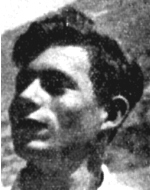Gaon, Eitan
Son of Shulamit and Aryeh, was born on 21.2.1929 in Haifa to a family of workers. He was a lively, playful boy, the head of the naughty people around. Rabbi Afik found himself energetic when he came to Kibbutz Alonim for training. Where he excelled as a student and as a worker and soon became a tractor operator and an expert locksmith. As a Palmach man, he specialized as a scout and during that time he knew the Negev and the Etzion Bloc very much, and he loved the country very much and was very impressed with his activities as a tour guide, , Radar explosion, etc., and not one risked his life. On “Black Saturday” (29.6.1946), during British searches and major political arrests, he was taken to the Latrun camp. Where he was active in an organization guarding Zionist leaders who were also imprisoned there. He was transferred to the detention camp in Rafah and there he was awake, active and encouraging. And excelled in organizing various handicrafts which somewhat reduced the prison’s desolation. After a few months he was released from Rafah and transferred to the base at Ramat Rachel At the beginning of the War of Independence he was sent as a scout with members of the “HAL” Department, the Palmach and Hachash fighters who were sent as reinforcements to Gush Etzion. 14.1.1948. The fighters departed from Hartuv on the night of 16 and 15 January and were loaded with weapons, ammunition and equipment, but due to the late hour of departure and the difficulties of the road, they could not reach Gush Katif in the night. At dawn, the department was discovered by villagers in the area of the villages of Beit Natif, Jaba and Surif, who called the Arabs of the area to the area and surrounded the department. The fighters organized on one of the hills (the “Battle Hill” today) and fought with the masses of Arabs until they all fell in battle on January 16, 1948. Eitan was brought to a mass grave in Kfar Etzion not long after his mother died, On November 17, 1949, he was transferred to the military cemetery at Mount Herzl in Jerusalem with the other victims of the Gush.
